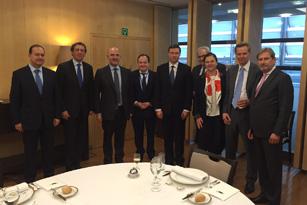
Between the European Commission, the European Investment Bank, the European Bank for Reconstruction and Development, the International Monetary Fund and the World Bank Group
Brussels, 1 December 2015
Joint Conclusions
We, the representatives[1] of the European Commission, the European Investment Bank, the European Bank for Reconstruction and Development, the International Monetary Fund and the World Bank Group, met in Brussels to discuss our respective engagement in the enlargement and neighbourhood regions of Europe. Enhanced cooperation between our Institutions is in our shared interest. Therefore, we also discussed how we could best coordinate our efforts in order to enhance cooperation between our Institutions, at management and staff levels, aiming, within each of our respective mandates, at better leveraging the efficiency and impact of the Institutions' common objectives in the Enlargement and European Neighbourhood regions, such as boosting growth, fostering economic transition, promoting socio-economic development and fostering political stability.
The combined financing of our Institutions across the region in all sectors represented an aggregate EUR 22bn[2] in investment in 2014. This was roughly equal to 1.1% of the region's GDP and to 2.5% of the region's overall budget. Better coordination of our policy dialogue and investments should increase the leverage of these activities, reinforcing the impact of each partner's work and supporting our partner countries more effectively in their transformation.
Coordination of activities between the Institutions already exists at regional and country level, in different forms and varying levels of intensity. However, in the face of ever-growing political and economic challenges, increasing financing needs, relatively constrained financing capacities and the need to demonstrate visible and concrete results of the Institutions' support to all stakeholders and citizens, cooperation between the Institutions can and should be enhanced significantly. This should be done based on best practices and taking due account and without prejudice to existing agreements entered into jointly or separately by the different Institutions. Enhanced cooperation should allow better leveraging existing financing flows to the regions and thereby achieving more tangible results on key common priorities.
We should therefore aim at enhancing our cooperation as reflected below, focussing on the following elements:
- Strategy and priorities: through regular, structured exchange of policy analysis and discussion on strategies, promote common goals and priorities, to allow defining appropriate policy responses to regional and country-specific challenges;
- Alignment on incentives: where possible and desirable, align the set of incentives underpinning respective support actions and their timing, to maximise reform leverage and ownership in beneficiary countries;
- Complementarity: explore ways to reinforce and complement each other's programs, based on the respective mandates, areas of expertise and the comparative advantages of each Institution;
- Concrete results: based on common goals and priorities set, establish short- and medium-term outcomes to be commonly supported, irrespective of which institution/s is/are in the lead on delivery;
- Communication and visibility: agree and implement modalities to ensure optimal visibility across the regions, as well as in the EU, for all support and operations. Communication should be included from the start as an integral part in the planning and programming processes.
In order to ensure such robust coordination and action on priorities and initiatives, the Institutions should set up an enhanced and more structured dialogue, based on annual High-Level multilateral Meetings per region, i.e. Enlargement, Neighbourhood East and Neighbourhood South. As appropriate, they should involve other relevant donors in the region. These annual meetings should be prepared by staff-level meetings adapted to the needs of each region and building on existing coordination frameworks.
[1]EC - IFIs Representatives: EC: Commissioner Johannes Hahn, EIB: Vice-President (VP) Ambroise Fayolle, EBRD: VP Philippe Le Houérou, IMF: Director Poul M. Thomsen, WBG: VP Cyril Muller, IFC VP Dimitris Tsitsiragos
[2] EBRD EUR 5.6bn, EIB EUR 5.3bn, WBG US$9.4bn, EU EUR 3.6bn. IMF is not included in this figure, given the specific nature of its financing.
Details
- Publication date
- 1 December 2015
- Author
- Directorate-General for Neighbourhood and Enlargement Negotiations
